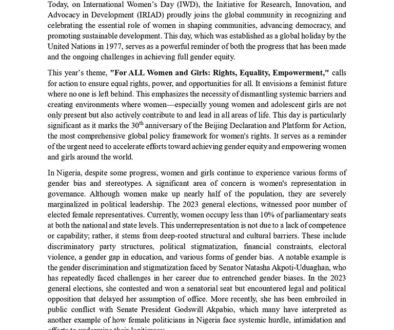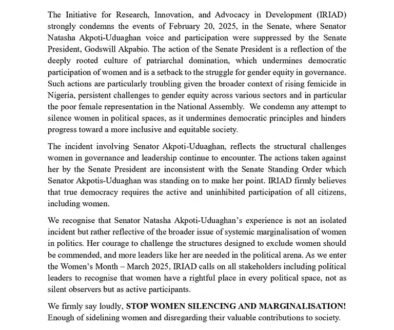Africa Youth Day 2024
We call upon policymakers to create inclusive policies that address challenges of youth, policies that not only provide educational opportunities but also promote entrepreneurship and innovation among young people. In addition, by creating platforms for dialogue and collaboration, we can ensure that youth voices are heard in decision making processes that affect their lives.
On the occasion of African Youth Day 2024, the Initiative for Research, Innovation and Advocacy in Development (IRIAD) and The Electoral Hub stand united in recognizing the significant contributions of youth to the future of Africa, particularly in Nigeria. Established by the African Union during the Banjul Summit in 2006, African Youth Day is observed annually on November 1st. This day serves as a vital reminder of the immense potential of Africa’s youth, who represent not only the continent’s largest demographic but also its most valuable resources. African Youth Day is more than a celebration; it is a clarion call to recognize and harness the collective power of over 420 million young Africans aged between 15 and 35 years, who constitute approximately 35% of the continent’s population. This day aims to amplify the voices of young people, encouraging increased awareness, commitment, and investment in their development. It seeks to enhance youth participation in decision-making processes at all levels and foster partnerships that transcend borders. The observance of this day emphasizes the importance of empowering young people to take leadership roles in their communities and beyond. It highlights the necessity for governments and stakeholders to prioritize youth engagement and support initiatives that cultivate their skills, creativity, and entrepreneurial spirit. By investing in education, health, employment opportunities, and civic engagement, we can unlock the potential of our youth as key drivers of social change and economic growth. In Nigeria, where youth make up a significant portion of the population, the challenges they face are numerous and multifaceted. Beyond the persistently high rates of unemployment and underemployment, young Nigerians face significant challenges within the justice and law enforcement systems. The recent arraignment at the Federal High Court, Abuja of many underage protesters of the #EndBadGovernance protest highlights the urgent need for reform in how the judicial and police systems interact with young citizens. The detention of minors, who were exercising their constitutional right to protest, raises serious concerns about the criminalization of youth activism and the violation of children’s rights as proscribed by chapter IV of the 1999 Constitution and Section 11 of the Child Rights Act 2003. These incidents reveal a broader pattern of systemic challenges where young people, particularly those engaging in civic activism, face harassment, intimidation, and arbitrary detention. The justice system’s treatment of youth protesters, especially minors, contradicts both national and international standards for protecting children’s rights and promoting youth civic engagement. This situation creates an environment of fear and distrust between young 1 citizens and law enforcement institutions, further alienating youth from participating in democratic processes. A critical concern is the under-representation of youth in governance. In the upcoming Ondo State governorship election scheduled for November 16, 2024, only two candidates fall within the age range of 18-35 years for both governor and deputy governor positions1. This contrasts with the fact that youth represented 39.65% of voters registered in 2023 amounting to 37,060,399 individuals making them the largest demographic group on the voter register2 . Despite this significant representation in the voter registration, their voices remain largely absent from key decision-making processes. This trend was also evident in the 2024 Edo State governorship election, where only one candidate was within the age range of 18-35 years among a larger pool of candidates3. Such limited representation highlights systemic barriers that prevent young people from participating meaningfully in political processes. The inclusion of youth in governance is crucial not only for ensuring that their perspectives are represented but also for promoting a political environment that resonates with the younger generations. Young people bring fresh ideas, innovative approaches, and unique insights into pressing societal issues. Their active involvement can lead to more inclusive policies that address their specific needs and aspirations. Recognizing these challenges, IRIAD is committed to advocating for youth inclusion through various initiatives aimed at empowering young people. We have conducted a series of training programs designed to educate youths about their rights and responsibilities within governance structures. These trainings focus on equipping them with essential skills such as civic education, political literacy, and advocacy techniques. Additionally, we produce infographics, cartoons and info bites that simplify complex political processes and highlight available platforms for youth engagement. These resources serve as vital tools for enlightening young individuals about how they can get involved in governance and the electoral process either through local councils, community organizations, national platforms or serving as election observers, party agents, ad-hoc staff etc. By providing these educational resources and training opportunities, we aim to empower young people with the knowledge they need to engage and participate in the political process effectively. Our goal is not just to inform but also to inspire action among youths so they can advocate for their rights and participate actively in shaping policies that affect their lives. We call upon policymakers to create inclusive policies that address youth unemployment and political participation, reform the justice and law enforcement systems to better protect young people’s rights, establish clear guidelines for law enforcement’s interaction with young
protesters, develop mechanisms for meaningful youth consultation in policy-making, and implement programs that promote youth entrepreneurship and innovation. As we commemorate African Youth Day 2024, let us unite in our efforts to celebrate our youth’s contributions while advocating for their rights and opportunities. Together, we can build a brighter future for Nigeria and Africa as a whole one where young people are empowered to lead us into a new era of growth and development.
#AYD2024 #AfricaYouthRise #AfricaYouthDay #YouthLeadAfrica
Signed
Princess Hamman-Obels, Director|IRIAD-The Electoral Hub
Phone: +234 9151221138 and + 234 9086998850
E-mail: electoralhub@gmail.com and comms.iriad@gmail.com
Twitter: @electoralhub and @iriadev
Instagram: @electoralhub, @theelectoralforum, and @iriadev
Facebook: @electoralhubng, @electoralforum, and @iriadev
LinkedIn: https://www.linkedin.com/company/the-electoral-hub and https://www.linkedin.com/company/iriadev
YouTube: https://www.youtube.com/@electoralhub1196
Website: https://www.iriadng.org and https://www.electoralhub.org
ABOUT IRIAD AND THE ELECTORAL HUB
The Initiative for Research, Innovation, and Advocacy in Development (IRIAD) is an interdisciplinary knowledge and advocacy hub committed and focused on developing a critical understanding of governance processes and regimes from research, documentation, policy engagements, public education and impact advocacy.
The Electoral Hub is an affiliate of IRIAD. It is committed to promoting electoral knowledge, integrity, and accountability in Nigeria. Our aim is to strengthen electoral governance and accountability in Nigeria through the provision of data, critical and contextualized analysis, and solutions to improve the credibility and integrity of the electoral process.
…Knowledge| Innovation | Inclusion|
#Advocacy #Results #Impact
…promoting electoral knowledge, accountability, and integrity


